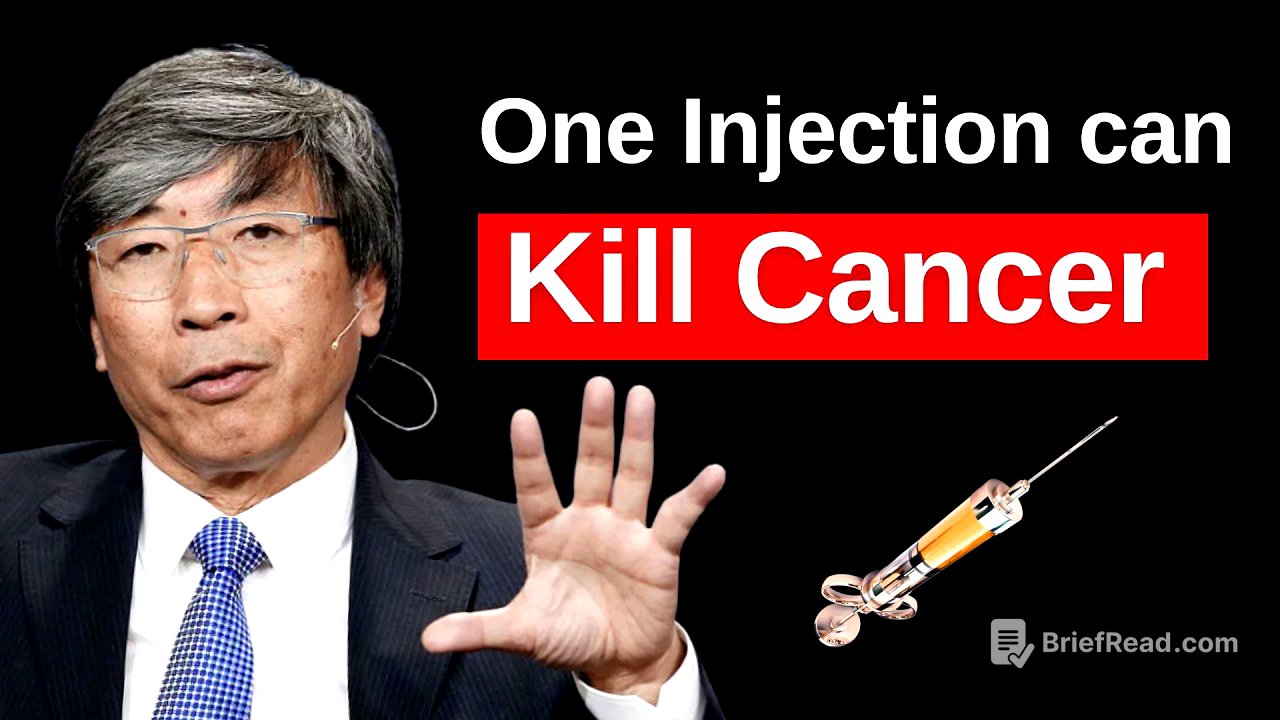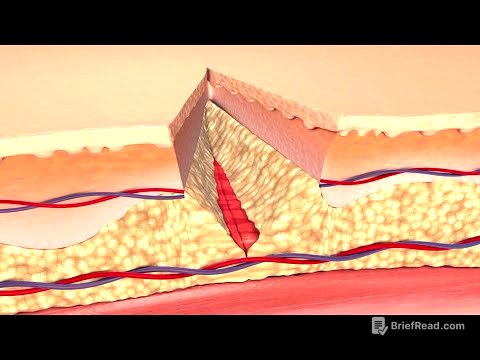TLDR;
This video discusses Dr. Patrick Soon-Shiong's innovative approach to cancer treatment, which focuses on boosting the immune system rather than directly attacking tumors. It highlights the limitations of traditional cancer treatments and the rising rates of cancer in younger populations. The video also shares practical, science-backed tips from longevity experts like Dr. Rhonda Patrick, Dr. David Sinclair, Dr. Valter Longo, and Dr. Jeffrey Bland on how to strengthen the immune system and activate T cells through lifestyle and nutrition.
- Traditional cancer treatments often have harsh side effects and limited long-term success.
- Cancer is viewed as a systemic issue, indicating a failure of the immune system.
- Personalized treatment approaches and immunotherapy are key to future cancer care.
- Lifestyle and nutrition play a crucial role in supporting immune function and T cell health.
What may be Wrong with the mainstream Pharmaceutical companies on Cancer? [1:39]
The mainstream pharmaceutical industry has historically treated cancer as a localized issue, focusing on treatments like surgery, radiation, and chemotherapy to directly kill cancer cells. This approach often damages healthy cells and has limited long-term success, leading to high recurrence rates and a cycle of dependency on medication. Despite significant research investments, the focus remains on treating the tumor rather than addressing the underlying immune system dysfunction that allows it to grow. This is concerning given the rising cancer rates among younger populations, suggesting the current model is failing to prevent or reverse the disease's trajectory.
Why is Cancer rising in young people? [2:58]
Cancer rates are increasing in younger demographics, including those in their 20s, 30s, and 40s, which raises questions about the effectiveness of current treatment models. The rise in early-onset cancers suggests that the focus on tumor destruction, rather than immune system restoration, may be missing a critical component in addressing the disease. This trend underscores the need to understand why younger, supposedly healthier individuals are developing cancer and to shift towards more comprehensive treatment strategies.
Cancer is a systemic, not a localized disease [3:07]
Dr. Patrick Soon-Shiong views cancer as a systemic failure of the immune system, not just a localized tumor. As people age, their natural killer cells and T cells decline, weakening the immune system's ability to recognize and eliminate abnormal cells. Treating cancer solely as a localized problem with surgery or chemotherapy overlooks the deeper issue of immune dysfunction. Dr. Soon-Shiong's approach focuses on restoring immune function to detect, attack, and remember cancer cells, effectively turning the immune system into the treatment itself.
Cancer treatment should be personalized [4:03]
Dr. Patrick Soon-Shiong advocates for personalized cancer treatment that moves away from the one-size-fits-all model of chemotherapy and radiation. Traditional chemotherapy is indiscriminate, killing healthy cells along with cancer cells and often failing to produce lasting results. He supports precision medicine, where treatment is tailored to the unique genetic and immune profile of each patient's tumor. By using genomic and proteomic profiling, doctors can understand how a tumor behaves and target it more effectively, with a focus on activating the body's immune system to combat cancer.
Dr. Rhonda Patrick on boosting the immune system [6:12]
Dr. Rhonda Patrick emphasizes the critical role of lifestyle and nutrition in supporting T cell health and overall immune function. Nutrients like vitamin D, zinc, magnesium, and omega-3 fatty acids are essential for T cell activation and signaling. Maintaining optimal vitamin D levels is particularly important, as T cells can remain inactive in its absence. She also promotes sauna use to mimic exercise-induced stress, which enhances immune surveillance and may increase the number of active T cells. Her practical advice includes regular sunlight exposure, a nutrient-dense diet, strength and aerobic training, and intermittent fasting to support a resilient immune system.
Dr. David Sinclair on boosting the immune system [7:10]
Dr. David Sinclair focuses on how cellular aging impacts immune function, including the decline of T cells over time. As we age, the immune system becomes less responsive due to epigenetic changes and mitochondrial dysfunction, leading to immune exhaustion. To combat this, he promotes strategies that slow aging at the cellular level, which may preserve and rejuvenate T cell function. His recommendations include intermittent fasting, regular exercise, cold exposure, and supplements like NMN (a NAD+ booster) and resveratrol to support mitochondrial health and DNA repair, ultimately aiming to extend health span and maintain a sharp immune system.
Dr. Valter Longo on boosting the immune system [8:03]
Dr. Valter Longo is known for his work on fasting and cellular regeneration, particularly through the fasting mimicking diet (FMD). Prolonged fasting, typically 3-5 days, can trigger the body to clear out damaged immune cells and stimulate the production of new T cells by activating stem cells in the bone marrow. This process helps reset the immune system and enhance immune resilience. For those who cannot do full water fasts, he created the FMD, a low-calorie, plant-based protocol that mimics the effects of fasting while still allowing some food. His advice includes periodic fasting under supervision, a mostly plant-based Mediterranean diet, and avoiding excess protein from animal sources.
Dr. Jeffrey Bland on boosting the immune system [8:53]
Dr. Jeffrey Bland, the father of functional medicine, focuses on how diet, environment, and lifestyle influence the immune system at a cellular level. Chronic inflammation, poor nutrition, and gut imbalance can weaken immune regulation and contribute to T cell dysfunction. His approach emphasizes creating conditions for immune balance and resilience rather than treating illness after it appears. He recommends a diverse anti-inflammatory diet rich in phytonutrients, polyphenols, omega-3 fatty acids, and fermented foods to support the gut-immune connection. Regular movement, sleep, stress reduction, and minimizing exposure to environmental toxins are also crucial for maintaining healthy T cell function.









